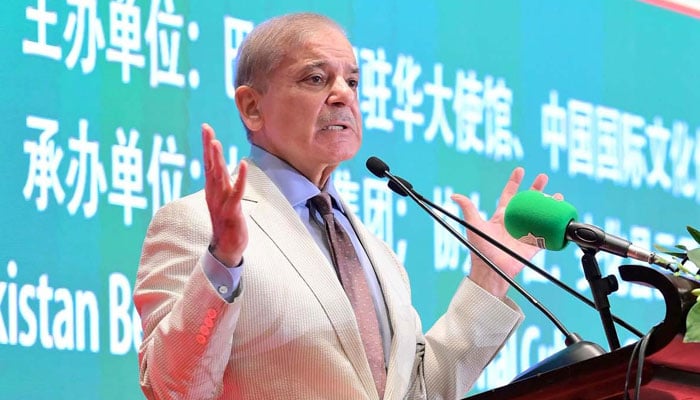Will the PM’s vision lead to action?
We have had four governors-general, 17 presidents, and 23 prime ministers. Since joining the IMF in 1950, Pakistan has had 24 IMF arrangements. Coincidentally, the 24th prime minister of Pakistan is the first in our history to lay the foundation of a ‘Homegrown Economic Plan’. Three questions: Why did it take us 74 years to understand that the IMF’s core mandate is to ‘promote international monetary cooperation’? Why did it take us 23 prime ministers to realize what is clearly spelled out in the IMF’s Articles of Agreement? Why did it take us 23 prime ministers to realize that the responsibility to reform and restructure directly falls on a ‘Homegrown Economic Plan’?
Tanzania’s Ministry of Finance went through 14 IMF arrangements before realizing the need to shift its focus to a ‘homegrown plan’. This led to the development of the ‘Mkukuta’ strategy, which emphasized self-reliance, agricultural development, and poverty reduction. The homegrown approach was presented to the IMF and implemented successfully.
Similarly, Rwanda’s Ministry of Finance and Economic Planning underwent 13 IMF arrangements before recognizing the necessity of focusing on a ‘homegrown plan’. Rwanda developed the ‘Vision 2020’ strategy, which centered on private sector-led growth and a market-oriented agricultural sector. This homegrown approach was presented to the IMF and implemented successfully.
The Vietnamese are fast learners. Vietnam’s Ministry of Finance went through only three IMF arrangements before realizing the need to shift its focus to a ‘homegrown plan’. This led to the development of ‘Doi Moi’ or ‘Renovations’. Imagine, Doi Moi was launched at the Sixth National Congress of the Communist Party of Vietnam. Doi Moi focused on three main objectives: transitioning from central planning to market mechanisms, privatizing SOEs and trade liberalization. Imagine: as a consequence of Doi Moi, direct foreign inflows soared from a billion dollars to $18 billion in 2022. Will Prime Minister Shehbaz Sharif's vision become a plan? Most probably. The real question is whether the plan will be implemented. Here are three crucial factors that will determine the success or failure of Pakistan's Homegrown Economic Plan: Implementation and execution, political stability and business environment.
A well-designed homegrown plan is only as good as its execution. The government's ability to effectively implement the plan's policies and allocate resources efficiently will be critical. This includes overcoming bureaucratic hurdles and building public trust.
To be certain, economic reforms require tough decisions that will be unpopular. And without political stability, the government will struggle to see the homegrown plan through potentially succumbing to short-term political pressures that could derail long-term goals.
Yes, the homegrown plans’ success hinges on creating a business-friendly environment. And creating a business-friendly environment involves three key actions: streamlining regulations, reducing red tape, and encouraging competition. For Pakistan, a window of opportunity has opened to transform its economic landscape through a homegrown plan. The lessons from Tanzania, Rwanda, and Vietnam underscore the importance of self-reliance. We must now forge a path that not only envisions change but also executes it with determination, political stability, and a supportive business environment. The success of this plan could finally set Pakistan on a sustainable course for growth and prosperity.
The writer is a columnist based in Islamabad. He tweets/posts @saleemfarrukh and can be reached at: farrukh15@hotmail.com
-
 Bucks Vs Thunder: Nikola Topic Makes NBA Debut As Milwaukee Wins Big
Bucks Vs Thunder: Nikola Topic Makes NBA Debut As Milwaukee Wins Big -
 King Charles Breaks 'never Complain, Never Explain' Rule Over Andrew's £12 Million Problem
King Charles Breaks 'never Complain, Never Explain' Rule Over Andrew's £12 Million Problem -
 Casey Wasserman To Remain LA Olympics Chair Despite Ghislaine Maxwell Ties
Casey Wasserman To Remain LA Olympics Chair Despite Ghislaine Maxwell Ties -
 Shaun White Is Back At The Olympics But Not Competing: Here’s Why
Shaun White Is Back At The Olympics But Not Competing: Here’s Why -
 Breezy Johnson Engaged At Olympics After Emotional Finish Line Proposal
Breezy Johnson Engaged At Olympics After Emotional Finish Line Proposal -
 King Charles Wants Andrew To 'draw A Line' Under Epstein Issue
King Charles Wants Andrew To 'draw A Line' Under Epstein Issue -
 John Wick Game Confirmed With Keanu Reeves And Lionsgate Collaboration
John Wick Game Confirmed With Keanu Reeves And Lionsgate Collaboration -
 Gigi Hadid Feels 'humiliated' After Zayn Malik's 'pathetic' Comment: Source
Gigi Hadid Feels 'humiliated' After Zayn Malik's 'pathetic' Comment: Source -
 Olympics Men Hockey Game: McDavid, Crosby Power Canada Past Czechia
Olympics Men Hockey Game: McDavid, Crosby Power Canada Past Czechia -
 Sony PlayStation State Of Play Reveals 'Castlevania' And 'Metal Gear' Return
Sony PlayStation State Of Play Reveals 'Castlevania' And 'Metal Gear' Return -
 Ontario Tuition Freeze Ends, Allowing Colleges And Universities To Raise Fees
Ontario Tuition Freeze Ends, Allowing Colleges And Universities To Raise Fees -
 King Charles Should Apologise To All Rape Victims, Says New Poll
King Charles Should Apologise To All Rape Victims, Says New Poll -
 Cardi B Shares Emotional Message Amid Stefon Diggs Split Rumors
Cardi B Shares Emotional Message Amid Stefon Diggs Split Rumors -
 James Van Der Beek’s 'heartbroken' Ex Wife Breaks Silence Of His Death
James Van Der Beek’s 'heartbroken' Ex Wife Breaks Silence Of His Death -
 Sarah Ferguson, Shamed Andrew Spotted In ‘family Costume Drama’
Sarah Ferguson, Shamed Andrew Spotted In ‘family Costume Drama’ -
 Kylie Kelce Reveals Why She Barely Planned Her Wedding Day?
Kylie Kelce Reveals Why She Barely Planned Her Wedding Day?




